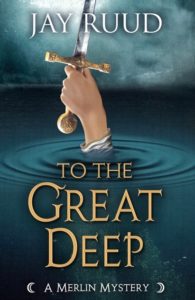Revolutionary Road
Richard Yates (1961)
[av_image src=’http://jayruud.com/wp-content/uploads/2014/08/Shakespeare-180×180.jpg’ attachment=’76’ attachment_size=’square’ align=’left’ animation=’left-to-right’ link=” target=” styling=” caption=’yes’ font_size=” appearance=’on-hover’]
Two of the nominees for the National Book Award for fiction in 1962 were Richard Yates’ novel Revolutionary Road and a little thing by Joseph Heller called Catch-22. In the end, neither novel won the award (it went to Walker Percy for The Moviegoer), but the Yates and Heller novels had much in common. Both were debut novels by American veterans of the European theater in World War II. Both dealt with the underlying theme of existential dread. And neither author ever produced another book anywhere close to the caliber of their premier novel. The fates of the two books, however, diverged considerably. Heller’s book, with its portrayal of the absurdity of war and the incompetence of those in charge, struck the perfect chord for the subsequent years of the turbulent ’60s and their antiwar fervor. Yates’s book, with its focus on the stifling conformity of mid-’50s suburban America, depicted the generation the ’60s were trying to eclipse. Accordingly, Catch-22 went on to sell millions and millions of copies in the next decade, while it was not long before Revolutionary Road was out of print and almost forgotten.
A reprint some twenty years after its initial publication reignited some interest in Yates’ book, and by 2005 Time magazine included the book in its famous list of the 100 best English-language novels since 1923. Unfortunately, Yates had died in 1992, and didn’t live to see this vindication of his magnum opus. The 2008 film version of the novel, written by Justin Haythe and directed by Sam Mendes (American Beauty, 1917), was a major critical success and starred Leonardo DiCaprio, Kate Winslet, Kathy Bates, and Michael Shannon. It brought the novel squarely into the public eye. I was completely unfamiliar with the book, but frankly when I saw the film version it was so devastatingly raw and painful that I was not moved to read the novel. As I recall, after my daughter saw it her reaction was “Perhaps you’d like complete emotional devastation with your popcorn?” It took me a dozen years to recover, but now I have finally read the book. If you take my recommendation and read the book yourself, perhaps it will put you in that same position.
The novel opens with an amateur theatrical production of Robert E. Sherwood’s 1935 drama The Petrified Forest. We’re told that three suburban Connecticut villages had recently been merged by Route Twelve, and that the younger adults of the three village have decided to form a community theater, The Laurel Players. The Petrified Forest is their maiden production in 1955. It begins rather roughly, but when the female lead, April Wheeler, takes the stage, the audience—and her fellow players—are charmed:
“Her name was April Wheeler, and she caused the whispered word ‘lovely’ to roll out over the auditorium the first time she walked across the stage. A little later there were hopeful nudges and whispers of ‘She’s good,’ and there were stately nods of pride among the several people who happened to know that she had attended one of the leading dramatic schools of New York less than ten years before….’Sometimes I can feel as if I were sparkling all over,’ she was saying, ‘and I want to go out and do something that’s absolutely crazy, and marvelous…’ Backstage, huddled and listening, the other actors suddenly loved her. Or at least they were prepared to love her…for she was suddenly the only hope they had.”
The scene is a microcosm of the novel as it moves ahead. April and her husband, Frank, long to do something “crazy and marvelous,” to somehow break out of the rut of their suburban conformist lives where the American Dream, having emerged from the financial crisis of the Great Depression and the political crisis of World War II, has shrunken to the safe conformity of home ownership, a steady job, and two kids with a mother at home and a father who cuts the grass on the weekend. The problem is that, like The Laurel Players, they are constantly acting—with their neighbors, with each other, with themselves. Everything’s a show. Frank, for example, is constantly practicing expressions in the mirror, to judge their effectiveness.
That opening play, by the way, ends in disaster. April cannot keep up the intensity of her brilliant performance in the face of her fellow actors’ blunders and ineffectiveness, and her performance deteriorates until, by the end, she’s as bad as everyone else. This does not bode well for the aspirations of the Wheelers as the novel develops.
Frank and April see themselves as different from their suburban neighbors, a cut above because of their aesthetic aspirations. Frank’s vanity was fed by his success as an undergraduate at Columbia at being a “Jean-Paul Sartre sort of man,” who liked to impress people by holding forth on deep questions. Another performance. Now, he laments his dull job in the promotion department of the Knox Business Machine Company and his equally dull suburban lifestyle. His first interaction with his wife ends with a bitter fight on the highway as they head home.
These acrimonious verbal battles continue through the novel, and are the chief reason for the excruciating reading experience. They are so pitch perfect in tone, so realistic in their presentation, that readers are left with the feeling that they have just seen the man behind the curtain. Indeed, all of Yates’ fiction is semi-autobiographical. He himself worked as a copywriter for Remington-Rand, a business machine company—a job he hated and dreamed of writing a novel that would get him out of it—and lived with his wife and daughter in Redding, Connecticut, reportedly living a life filled with drunken parties and dull suburban neighbors, and a good deal of marital squabbling that would end in divorce in 1959.
In the novel, Frank does not have the talent to write a novel, but does believe he is destined for greater things, and April, deciding that she is the reason he has failed to “find himself,” proposes that they chuck their suburban life and move to Paris, where she will work to support the family (itself anathema to gender roles of the ’50s) and he will finally realize his potential, whatever that is.
This plan regenerates their marriage, though it horrifies the couple’s Connecticut neighbors—all except John Givings, son of their realtor, who is taken by Frank’s eschewing of what he calls “the hopeless emptiness of everything in this country,” and enthusiastically endorses their plans. Trouble is, John is the inmate of a mental institution. In the 1950s, do we question the sanity of anybody who veers from the standard party line? In any case, the move to Europe falls apart when Frank is offered a big promotion at work (and begins an affair with a co-worker), and when April finds herself pregnant. Although she decides she wants an abortion in order to make the Paris plan possible (a particularly bold step in pre-Roe v. Wade America), Frank spends weeks talking her out of it, even implying that this desire is the result of her own unstable childhood. And he encourages her to enter psychoanalysis. Like the world he has consistently scorned, he suggests that nonconformity is a symptom of mental illness.
To reveal any more of the plot would be to give away too much. Suffice it to say that, as you’ve no doubt gathered, things don’t end well. But this is a novel that William Styron said “deserves to be a classic,” that Tennessee Williams called “a masterpiece in modern American fiction,” and that fellow World War II vet Kurt Vonnegut called “one of the best books by a member of my generation.” That’s high praise, and, painful as it is to read, the book deserves it. Four Shakespeares for this one.
NOW AVAILABLE

To the Great Deep, the sixth and final novel in my Merlin Mysteries series, is now available from the publisher, Encircle Publishing, at http://encirclepub.com/product/to-the-great-deep/
You can also order from Amazon (a Kindle edition is available) at https://www.amazon.com/Jay-Ruud/e/B001JS9L1Q?ref=sr_ntt_srch_lnk_1&qid=1594229242&sr=8-1
Here’s what the book is about:
When Sir Agravain leads a dozen knights to arrest Lancelot in the queen’s chamber, he kills them all in his own defense-all except the villainous Mordred, who pushes the king to make war on the escaped Lancelot, and to burn the queen for treason. On the morning of the queen’s execution, Lancelot leads an army of his supporters to scatter King Arthur’s knights and rescue Guinevere from the flames, leaving several of Arthur’s knights dead in their wake, including Sir Gawain’s favorite brother Gareth. Gawain, chief of what is left of the Round Table knights, insists that the king besiege Lancelot and Guinevere at the castle of Joyous Gard, goading Lancelot to come and fight him in single combat.
However, Merlin, examining the bodies on the battlefield, realizes that Gareth and three other knights were killed not by Lancelot’s mounted army but by someone on the ground who attacked them from behind during the melee. Once again it is up to Merlin and Gildas to find the real killer of Sir Gareth before Arthur’s reign is brought down completely by the warring knights, and by the machinations of Mordred, who has been left behind to rule in the king’s stead.

